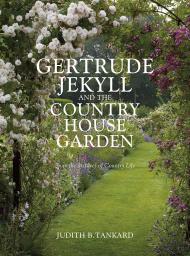Це перша книга за понад два десятиліття, присвячена найважливішому садовому дизайнеру ХХ століття.
Ґертруда Джекілл (1843–1932) заклала основу для сучасного садового дизайну, і їй приписують популяризацію неформального, натуралістичного вигляду в контрапункті до жорстких, формальних ландшафтів вікторіанської епохи. Її співпраця з Едвіном Лутієнсом створила основоположні садові шедеври руху мистецтв і ремесел, зокрема Hestercombe і Folly Farm.
Також відомий як плідний і впливовий письменник, Джекілл написав понад сто статей для Country Life і спроектував три сади для засновника видання Едварда Хадсона. Завдяки цьому в архіві Country Life є неперевершений запис її роботи.
Ця книга включає в себе поєднання архівних чорно-білих і сучасних кольорових фотографій, які висвітлюють добірку з понад 350 садів, створених Джекіллом.
Книга складається з чотирьох розділів і завершується великою бібліографією та покажчиком.
Вступ: біографічний огляд: сім'я, навчання, ранні впливи, подорожі, домівки; Досягнення як художника, садівника, дизайнера та письменника; Коло друзів: художники, садівники, архітектори, письменники; важливість їхніх особистих садів, таких як Gravetye Manor і Warley Place; Relationship with Country Life, Hudson, E. T. Cook, Robinson, Tipping, Weaver, Hussey; Важливість статей, книг та редакційної діяльності GJ, пов’язаної з Country Life Home and Garden: Обговорення Munstead Wood: його дизайн, розробка, роль Lutyens, роль Джекілла в книгах і статтях для Country Life; візуальні ефекти ч/б, автохроми та новий колір. Сади Лютієнса та Джекіла: обговорення їхніх робочих та особистих стосунків; Стиль Jekyll з дизайном Lutyens; розвиток їхнього партнерства; Приклади: Orchards (1899), Tigbourne Court (1899), Goddards (1899), Deanery (1901), Bois des Moutiers (1904), Millmead (1905), Marsh Court (1905), Folly Farm (1906), Lambay (1907), Hestercombe (1908), Lindisfarne (1911), Gledstone (1925), Queen's Dolls' House (1924) Gardens for Small Country Houses: стиль дизайну саду Джекілл, її робота з іншими архітекторами, сади, про які вона писала в Country Life, і вплив на інших дизайнерів; Приклади: Owlpen Manor, Little Boarhunt і Durford Edge (Triggs); Mounton House (Чайові); Hurtwood House і Westbrook (Тернер); Manor House at Upton Gray (Newton), Townhill Park (Guthrie); Valewood Farm, Woodhouse Copse, (Oliver Hill) Garden Ornament: загальні риси стародавніх садів, взяті з книг Джекілл Wall and Water Gardens, Gardens for Small Country Houses і Garden Ornament, з її коментарями; Приклади пергол, альтанок, водних споруд, садових будиночків, орнаментів тощо, як-от Iford, Easton (Peto); Деканат, Хейвуд, Марш-Корт (Лютієнс); Mathern and Mounton (Тіпінг); Leasoes та інші будинки Cotswold (Gimson та інші); Little Boarhunt (Triggs) тощо.
